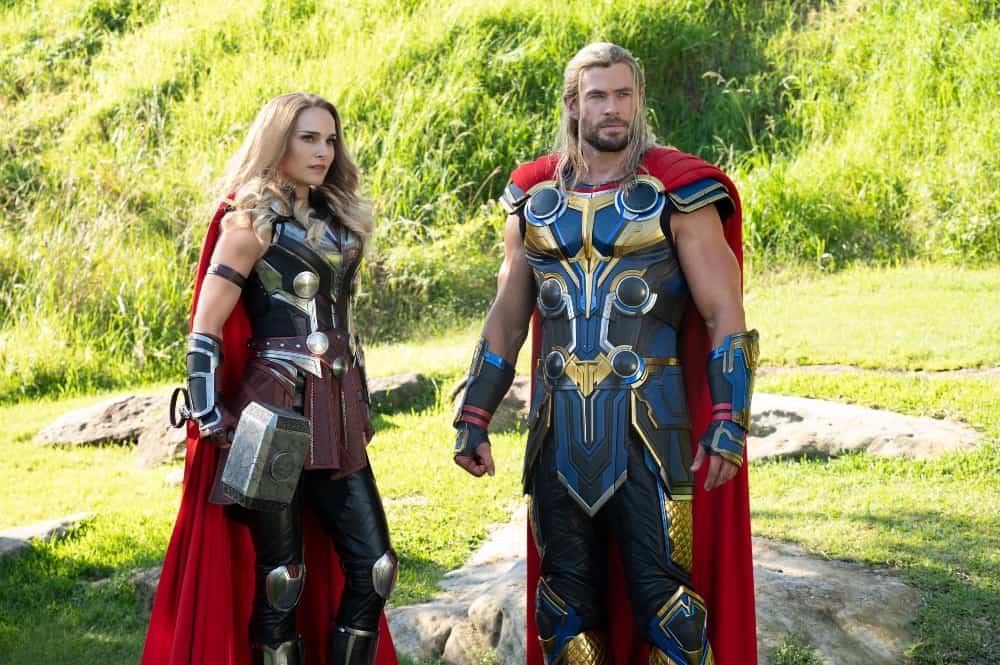
2019’s Avengers: Endgame clocked in at 182 minutes, The Batman at 179, but Thor: Love And Thunder proves that superhero films don’t need to be excessively long.
Taika Waititi’s Thor: Love And Thunder is refreshing in many ways. It has a sympathetic, but still creepy antagonist in Christian Bale’s Gorr the God Butcher, and well-written storylines for all of its major characters. It’s also colourful, comedic, and immensely fun. Above all, though, it’s just under two hours long.
This isn’t unheard of in the Marvel film franchise – it last happened with 2016’s Doctor Strange. Nonetheless, we’re used most of these superhero movies lasting for around two and a half hours, even if they don’t usually need to be that long. Sam Raimi’s Doctor Strange In The Multiverse Of Madness put a stop to that. In just over two hours he told a wacky, visually interesting, and largely self contained story, though admittedly the film also had its flaws.
With Thor: Love And Thunder, director Taika Waititi continues that trend and shows that you can craft a well-written story in a way that’s enjoyable and concise. Not one character or plot point is neglected in this movie. Every member of the main cast is given plenty of time to shine, each of their characters gets a complete and emotionally moving arc, and it’s done without the need to drag things out.
It doesn’t just hurtle towards a conclusion, either. In that two hours there’s time for playful asides, running jokes about screaming goats, and for Russell Crowe to steal the spotlight with an outrageous Zeus performance. Despite being in the fourth phase of films in the Marvel cinematic universe, it doesn’t get bogged down in everything that’s come before it. In fact, it uses Korg’s role as narrator to swiftly (and amusingly) summarise the important stuff.
This might be part of Marvel’s problem when it comes to long runtimes. Building a shared universe requires a lot of attention to detail, and a lot of recurring characters and cameos. Avengers: Endgame was the culmination of over a decade of worldbuilding, and was obliged to feature all of the main characters in the series. It’s no wonder it struggled to last under three hours. We’ve written before about the foreknowledge problem of modern franchise blockbusters, and no franchise seems to suffer from this more than Marvel.
I believe it’s more than that. A three hour runtime could be excused for a film that’s tightly-written, where every scene feels necessary. However, for me, Avengers: Endgame became a bit of a slog – especially in the middle section. Many parts of the time travel plot weren’t necessary to the tale being told – a lot of scenes were designed simply as fan service, or to set up future stories (we’re looking at you, Loki). In other words, there were places in which the film could have been slimmed down without compromising on what made it great.
It’s understandable that a huge franchise would want to tease further movies, but in Multiverse Of Madness and Love And Thunder this is successfully saved for the mid credits scenes. It doesn’t encroach on the main plot.
Writing is also an issue in other long Marvel instalments. Take The Eternals, for instance, where there are so many characters to introduce, and yet even in two and a half hours the film struggles to make us care for any of them. As I mentioned previously, the fact that Love And Thunder ensures that all of its characters get their emotional moments makes it the antithesis of this.
Taika Waititi also seems to realise that too many references to the wider franchise can hamper good storytelling. It’s apparent from the first ten minutes of Love And Thunder that the director’s trying to rid himself of all ties to Avengers: Endgame as quickly and efficiently as possible. Thor’s weight, gained during the last Avengers film, is shed in a lightning-fast montage, and an excuse to part ways with the Guardians of the Galaxy presents itself very early on. Free from the constraints placed on him by the previous film, Waititi’s then able to tell his own contained story in the way that he chooses, and the movie is better off for it.
It’s also apparent in the much-publicised decision to remove several notable cameo appearances. Both Peter Dinklage’s Eitri (from Avengers: Infinity War) and Jeff Goldblum’s Grandmaster from Waititi’s Thor: Ragnarok were set to appear in the film, but their scenes ended up on the cutting room floor. It was also reported that Game Of Thrones actor Lena Heady has a deleted role in the movie. And yet, Love And Thunder doesn’t feel like it’s missing anything by cutting these characters out.
It just goes to show that a longer film is not always a better one, or better written. It’s usually possible to tell a good story with well-developed characters in an amount of time that doesn’t leave your bum going numb in the cinema seat. Personally, I hope that’s a trend that continues.
—
Thank you for visiting! If you’d like to support our attempts to make a non-clickbaity movie website:
Follow Film Stories on Twitter here, and on Facebook here.
Buy our Film Stories and Film Stories Junior print magazines here.
Become a Patron here.





